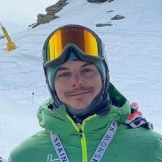When we talk about video recording a run in alpine skiing, the most common and simple way is to capture the whole run for later video analysis.
In this article we will discuss different shots and angles that can provide better feedback to the athlete.
Undoubtedly, the integration of the data provided by Protern.io GPS together with the different recording possibilities that exist today, gives us excellent information when it comes to video analysis.
Follow Cam View
Sports cameras, such as those from GoPro, DJI, and Sony, have come a long way in terms of filming quality and stabilization.
These cameras allow us to have an angle of view very close to the athlete and the possibility of recording in different shots: First person, follow cam, back and front shots, and from a lower or higher angle.
Filming from the back is also easier for the athlete to process their technique and change, as there is no mirror effect from a front facing camera.
In our case, we have recorded with an Insta360 camera from behind and with a slightly more aerial angle and added Protern.io GPS speed data to the video.
Pros and cons of a follow cam
Pros
- Different angles of view
- Following angle is easier for the athlete process
- Wide field of view
- Great for sharing on social media
Cons
- Not possible to record more than one athlete per run
- Can be dangerous to follow the athlete
Tripod Mounted Camera
This is not the most common way of recording, but it is the most effective when it comes to making comparisons between different runs and athletes.
Its main flaw is that we can only film a specific section of the run, which limits us to a small field of view.
This method is very good for working on specific objectives both technically and tactically. For example, being able to compare different line options during a key point of a run in SuperG or Downhill.
Adding Protern.io metrics, a tripod based camera becomes a very powerful tool with objective and real data on speed, acceleration, and G forces.
Above is an example of 1 vs 1, or ghost comparison. Below is an example of side-by-side, split screen comparison.
These videos also illustrate a limitation of comparing two athletes who are a fair bit different. By the middle of the run, the comparison is out of sync. With the tripod, it is possible to resynchronize the video at a point further down the course.
Pros and cons of a tripod mounted camera
Pros
- Best for comparisons
- Good for analyzing a specific section
- Possible to watch the athlete without focusing on the camera
Cons
- Carrying the tripod
- Only a specific section can be recorded
- Not possible to use the zoom when doing overlay or ghost comparison
Drone
Drones have evolved a lot. There are models that can follow a skier without the need of someone piloting the drone. It can be very useful for tactical aspects of line selection. Ski cross in particular, they can be useful as they aren’t impacted by the course features and jumps.
Unfortunately, the use of a drone can be complicated since most ski resorts ban their use. You be required to get special permission from the resort.
Pros and cons of using a drone
Pros
- Good for tactical analysis
- Well suited for Ski Cross video analysis
Cons
- Difficult to use at most ski resorts
- Not suited for technical analysis
Combining multiple angles
There is always the option to combine the multiple views. This requires more time to setup, sync and edit, as well as more cameras. The benefit may not out way the hassle.
About the author: Daniel Sanz

Daniel is a ski coach passionate about the digital world and the pursuit of performance of his athletes.
His alpine ski coaching career started with his local ski team, and has since expanded internationally. He has worked with World Cup level athletes and coaches around the world, including Austria, Japan and New Zealand.



